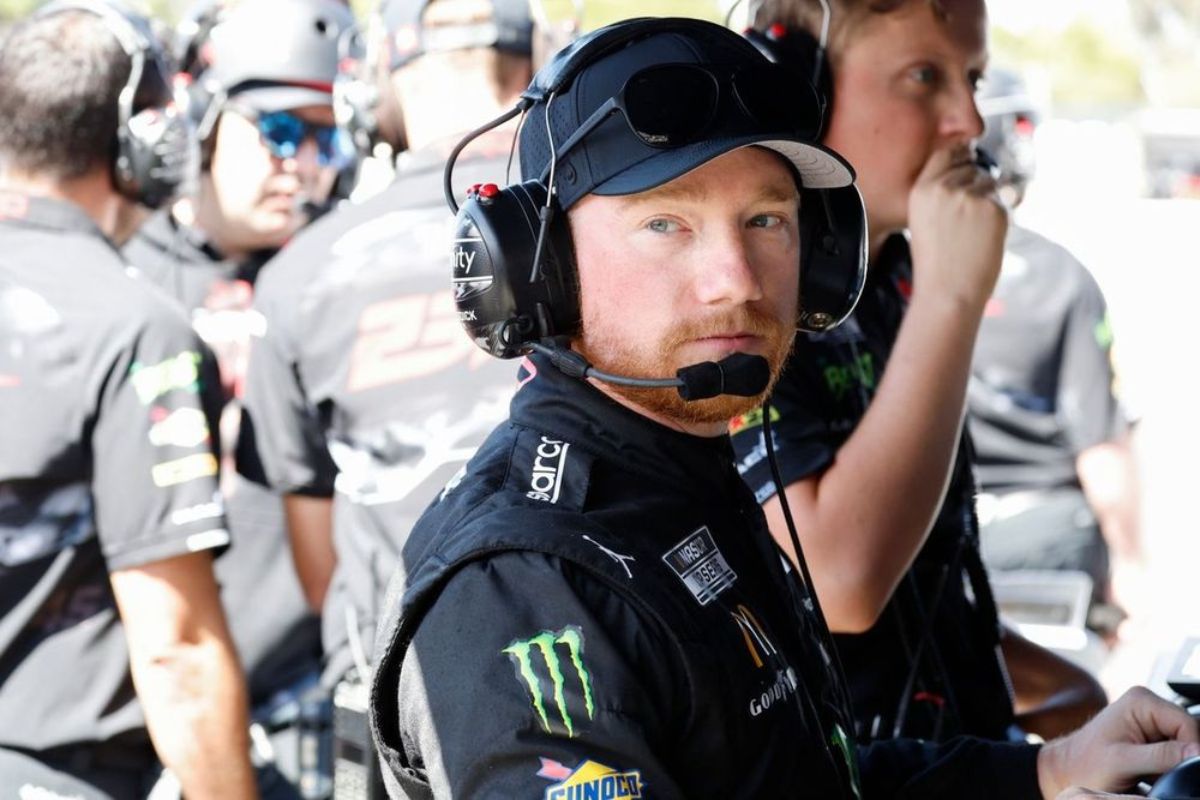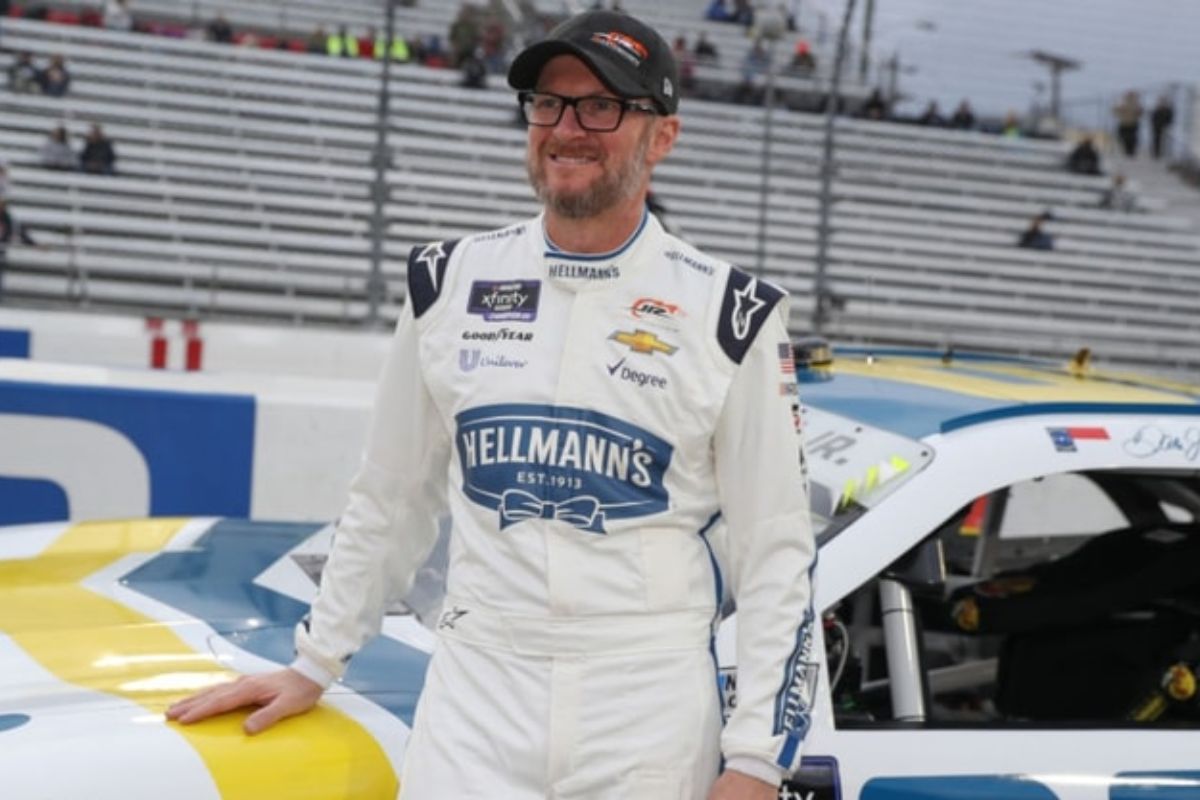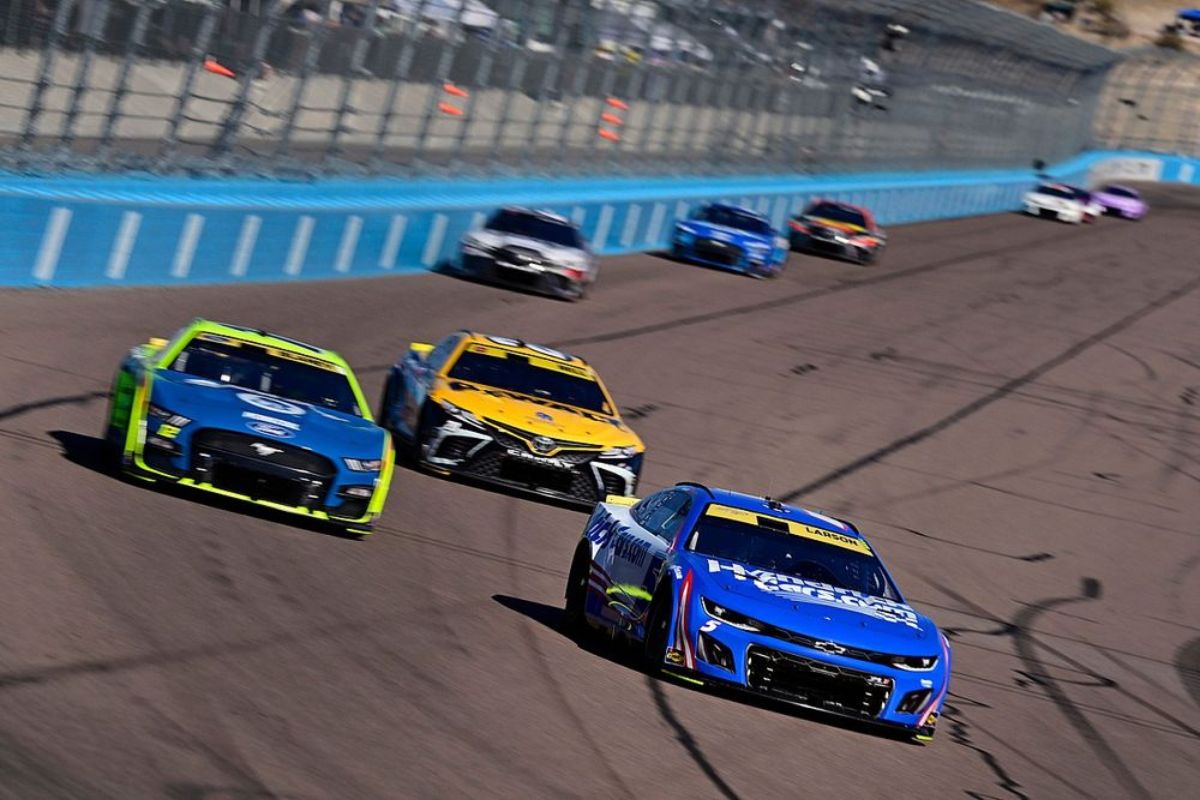NASCAR’s Michigan Race Results Questioned: The recent Michigan race has reignited debates surrounding NASCAR’s officiating practices, particularly after Tyler Reddick‘s substantial lead was nullified by a late caution—a situation that has garnered the support of Dale Earnhardt Jr. Both figures have raised questions about the integrity of race outcomes and the potential influence of entertainment considerations on officiating decisions. This controversy reflects the frustrations of fans and highlights the crucial need for consistency and transparency in the sport. As these discussions unfold, one must consider the implications for NASCAR’s future credibility and fan engagement.
Key Highlights
- Tyler Reddick criticized the late caution at Michigan, claiming it was unjust compared to a similar situation at Indianapolis.
- Dale Earnhardt Jr. echoed Reddick’s concerns, emphasizing the need for consistent officiating to maintain competitive integrity.
- The late caution disrupted Reddick’s commanding lead, raising questions about NASCAR’s decision-making processes and motivations.
- Fans and industry figures alike demand clearer guidelines on caution flags to ensure fair treatment of all competitors.
- Inconsistent officiating undermines NASCAR’s credibility, potentially eroding fan trust and perceptions of fairness in the sport.
Tyler Reddick’s Frustration Over Late-Race Caution
Tyler Reddick’s frustration following the late-race caution at Michigan highlights a broader concern regarding NASCAR’s decision-making process. His understandable frustration stems not merely from the interruption of a race he appeared poised to win but from the perceived inconsistency in how caution flags are employed across different events.
In the Michigan race, a caution was thrown under circumstances that many in the racing community deemed unwarranted, particularly when contrasted with the earlier Indianapolis race, where Austin Cindric’s incident did not result in a yellow flag.
This inconsistency raises critical questions about the criteria NASCAR employs when deciding to halt a race. The subjective nature of these decisions can lead to considerable consequences for drivers and teams, particularly those like Reddick who are in the running for victory.
The impact of a late caution can alter race strategies, affect pit stop timing, and disrupt the rhythm that drivers cultivate during a race. As the sport evolves, maintaining a transparent and consistent approach to race officiating becomes imperative for preserving the integrity of competition.
Reddick’s frustrations resonate beyond his personal experience; they echo the sentiments of many within the NASCAR community who seek clarity. The disparity in calls not only affects race outcomes but also undermines the trust that drivers and fans place in the governing body.
Dale Earnhardt Jr.’s Perspective on NASCAR’s Decision
The concerns raised by Tyler Reddick regarding NASCAR’s inconsistent application of caution flags have prompted further examination of the governing body’s decision-making processes.
Veteran driver Dale Earnhardt Jr. has added his voice to the discussion, highlighting the implications of NASCAR’s recent choices, particularly in the context of race dynamics and fan perception. On his podcast, Dale Jr. Download, he emphasized that the speed at which decisions are made is a critical aspect that warrants scrutiny. He stated, “The quickness of it (the decision) is the only concerning part,” suggesting that such haste can lead to questions about the integrity of the competition.
Fans have increasingly speculated that NASCAR’s decisions might be influenced by a desire to amplify the race’s dramatic value, potentially prioritizing entertainment over fair play. This raises notable concerns about the sport’s credibility and the trust between the governing body and its audience.
Earnhardt Jr.’s insights reflect a broader unease within the racing community about how such decisions can impact not only the outcomes of races but also the comprehensive experience for fans and competitors similarly.
As NASCAR navigates the delicate balance between maintaining competitiveness and delivering thrilling entertainment, the scrutiny of its operational protocols becomes critical. Earnhardt Jr.’s perspective serves as a reminder that transparency and consistency in decision-making are vital for preserving the sport’s integrity and fostering trust among its stakeholders.
Dale Earnhardt Jr. Agrees with Tyler Reddick’s Frustration
Frustration within the NASCAR community has reached a boiling point, as Dale Earnhardt Jr. has publicly aligned himself with Tyler Reddick’s discontent regarding the recent late-race caution during the Michigan race. The incident, which saw Reddick lose a commanding lead due to a caution triggered by Martin Truex Jr. lightly brushing the wall, has raised considerable questions about NASCAR’s decision-making process.
Reddick’s reaction encapsulated the sentiments of many fans and drivers similarly, as he questioned the necessity of the caution. His statement, “Is this a f**ing joke? Come on. It’s bulls**t. He touched the fu**ing wall. … Good grief.” reflects a broader conversation about race integrity and the impact of subjective calls on outcomes. Earnhardt Jr.’s support for Reddick highlights a growing concern that such decisions can undermine the competitive spirit of the sport.
“If I was driving the car leading the race, hell yes, I have the same reaction as Reddick, and maybe even you know running in the top 10 or the top five I might have the same reaction like what the hell?” – jr
This incident highlights the ongoing tension between competitive fairness and safety protocols within NASCAR, signaling a need for introspection and possible reform.
Dale Earnhardt Jr.’s Thoughts on NASCAR’s Motivation
Dale Earnhardt Jr.’s reflections on NASCAR’s decision-making reveal a deeper concern about the motivations behind race officials’ calls. His frank agreement with Tyler Reddick’s frustration highlights the pervasive skepticism among drivers regarding the integrity of race outcomes. Reddick’s experience—losing a potentially comfortable victory—invites scrutiny into whether NASCAR is prioritizing entertainment over fairness in critical moments.
Junior articulated a perspective that resonates with many competitors: the instinct to let races conclude naturally, especially when the finish line is within reach. His assertion that he would advocate for continuity rather than interruption accentuates a belief in the sport’s authenticity. “If I was in the booth,” he stated, “I would be like oh no, keep them going, don’t throw the yellow.” This approach suggests a fundamental desire to respect the competitive spirit that defines racing, prioritizing the drivers’ agency over external influences.
Furthermore, Junior’s insights highlighted the broader implications of race officiating decisions. The tension between maintaining excitement and ensuring equitable results poses a critical dilemma for NASCAR. When race calls are perceived as arbitrary or self-serving, the very foundation of competitive integrity is undermined.
“I’m thinking though that for TV, they can deny it if they want, but for TV for the promoter, track owner, and possibly for NASCAR, they’re thinking, Oh hell yeah, late-race restart drama. Oh yeah, you know we’re trying to our audience is building all the way through the race right? So right there in the last 10 laps, you’ve got the largest audience you’ve got the most people paying attention to what you’re doing and can you give them something exciting?” – jr
Consequently, Earnhardt Jr.’s reflections serve as a call to action for NASCAR to re-evaluate its motivations, ensuring that the sport remains grounded in principles of fairness and respect for the athletes who dedicate themselves to the craft. In doing so, NASCAR can preserve the trust and engagement of its fanbase, which is essential for the sport’s longevity.
Comparing the Michigan and Indianapolis Race Incidents
A critical examination of the incidents at the Michigan and Indianapolis races reveals substantial disparities in NASCAR’s officiating decisions that warrant scrutiny. The contrasting responses to incidents involving Austin Cindric and Martin Truex Jr. highlight a troubling inconsistency in NASCAR’s application of race regulations.
In Michigan, a late caution was issued following Truex’s spin, which many, including Dale Earnhardt Jr., argue was orchestrated to improve race drama for viewers. The timing of the caution, coming in the final laps, created a scenario ripe for heightened excitement, benefiting promotional interests.
“Good chance that NASCAR and a lot of eyeballs are paying close attention to that right. So maybe that’s why there’s a difference between the reaction to those two incidents just saying. I wish they hadn’t thrown the yellow because it wasn’t probably that necessary.” – jr
Conversely, during the Indianapolis race, NASCAR opted not to throw a caution after Cindric’s spin, allowing Kyle Larson to secure a victory despite the late-race incident. Here, the rationale appears to hinge on the visibility and implications of the drivers involved. Earnhardt Jr. suggests that Cindric’s positioning in the race, far from the leading pack, may have rendered the incident less important in the eyes of officials, consequently justifying their decision to continue racing.
“There’s also the idea that maybe nobody was watching Cindric’s ass running back there wherever he was at, you know, even if he’s running 12th, 15th, 10th, 20th. I don’t know where he’s running, but maybe they ain’t even looking over there. He’s not the focus.” – jr
This selective enforcement raises critical questions about fairness and transparency in NASCAR’s officiating. The apparent prioritization of viewer engagement over equitable rule application not only jeopardizes the integrity of the competition but also undermines fan trust.
For NASCAR to maintain credibility, a consistent approach to cautions across races is fundamental. Without it, the integrity of the sport remains in jeopardy, complicating the relationship between the governing body and its audience.
News in Brief: NASCAR’s Michigan Race Results Questioned
The recent Michigan race highlights considerable concerns regarding NASCAR’s officiating consistency and its potential impact on competitive integrity. The late caution that disrupted Tyler Reddick’s lead raises critical questions about the influence of entertainment value on race outcomes. Support from Dale Earnhardt Jr. further amplifies the call for transparency in decision-making processes. Addressing these concerns is vital to restore fan trust and uphold the credibility of NASCAR as a respected motorsport.
ALSO READ: Dale Earnhardt Jr.’s Xfinity Comeback: Kelley Earnhardt Raises Doubts



